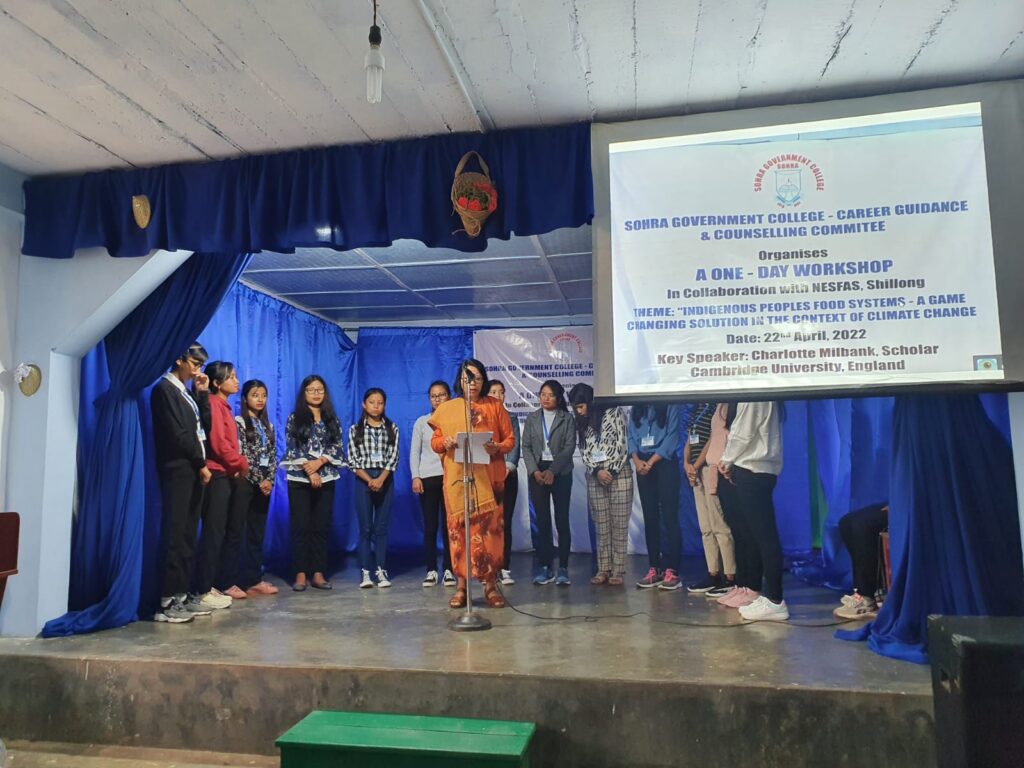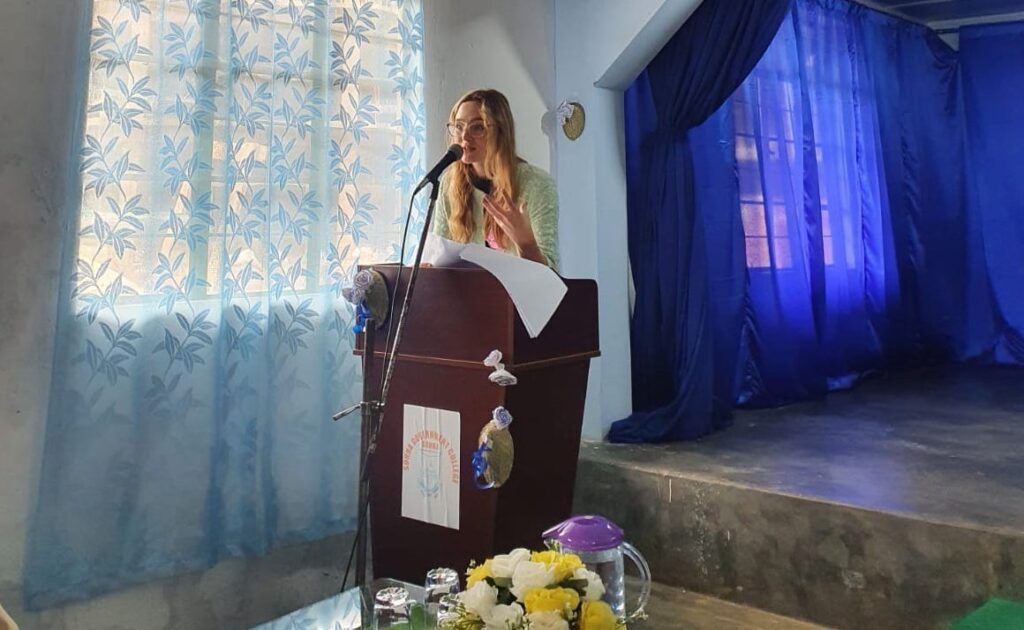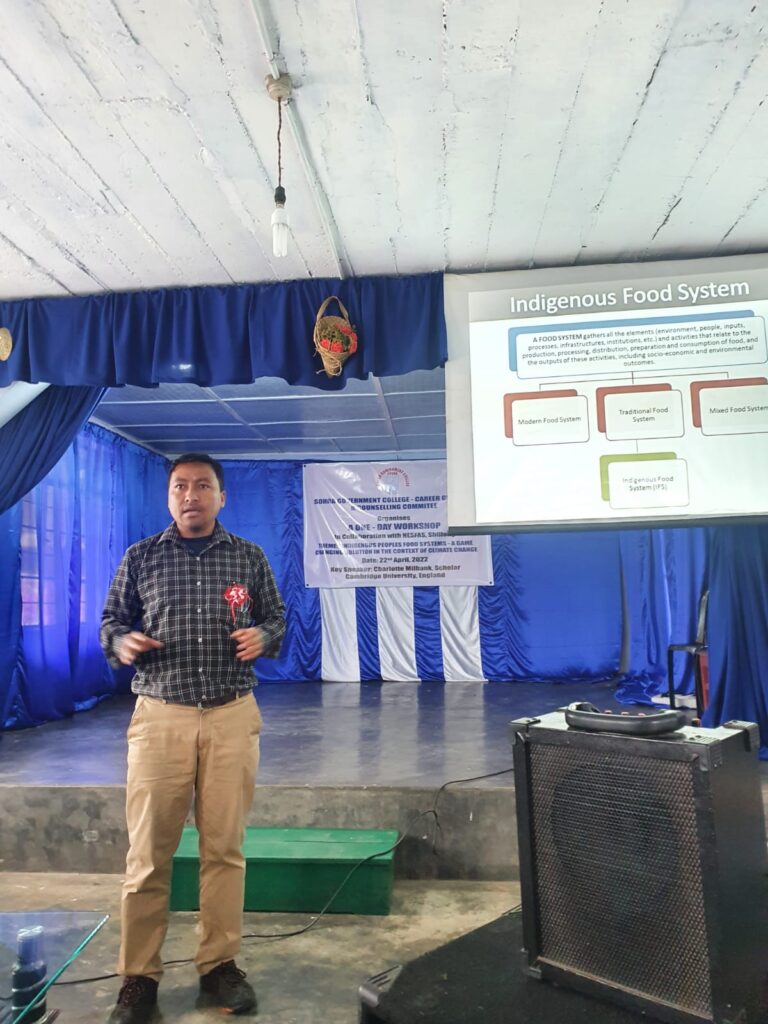Sohra Government College, Sohra, in collaboration with NESFAS, Shillong, organised a one-day international workshop on Career Guidance and Counseling on April 22, 2022, on the theme “Indigenous Peoples’ Food Systems- A game changing solution in the context of climate change”. Charlotte Milbank, Research Scholar, University of Cambridge, UK, was the keynote speaker of this session.
The main goal of this programme is to generate awareness and interest among college students regarding the importance of local food systems in the context of climate change and biodiversity.
The programme began with a welcome speech by Dr. A. Lyngdoh, Principal, Sohra Govt. College. She shared, “Sohra Government college, formerly known as Sohra college, was established in 1982 to cater to the educational aspirations in and around Sohra area.
The college has come a long way since its inception and was recently accredited B+ by NAAC. At present, it has more than 600 students and is the only college in a radius of 50 km. Students enrolled in the college are mostly from rural areas such as Khatarshnong, Pynursla, Shella and other distant villages.
During the first half of the programme, Alethea Kordor Lyngdoh, Lead Associate, Communications, NESFAS, briefly shared about the journey of NESFAS and its role in promoting Indigenous Food Systems. She also stated that the year 2022 marks the 10th year anniversary of NESFAS.
She also emphasized that NESFAS is working on strengthening local livelihood opportunities for the youth. She remarked, “NESFAS believes that youth are the beacons of hope. It is important that they are empowered because they are the leaders of tomorrow. The issue of unemployment among youth and youth migration can only be mitigated by initiating local and eco friendly livelihood options in the community itself”.
Ms. Charlotte Milbank presented her current research that is focused in Meghalaya- ‘Wild Foods for Sustainable Food Security and Health within Indigenous People’s Food Systems’. She stressed on the scope of research and the biodiversity that the region has to offer. She delightedly expressed, “It was a pleasure to be invited to speak at Sohra Govt. College, and talk with the students about some of the challenges and opportunities facing Indigenous Peoples’ food systems worldwide”.
The programme also highlighted how to build a cadre of local food youth enthusiasts to promote and defend their own local food and to make students aware about the importance of research and train them to be local researchers and to improve their employability skills.
Dr. Bhogtoram Mawroh, Senior Associate, Research and Knowledge Management, NESFAS, presented on the ‘Indigenous Food System: A bulwark against biodiversity loss’. He pointed out that Indigenous Food System is very important for adaptation to climate change and youths are going to play a very important part in it as the responsibility for preserving and strengthening lies with them. “The more than 100 students who attended the program and took part in the discussion give hope that they will shoulder that responsibility with full dedication and sincerity”, shared Dr. Mawroh after the programme.
The aim of this programme is to increase the partnership between Sohra Govt college and NESFAS in the areas of research and capacity building for young people thereby opening up job opportunities for students and to sensitize the participants about the global debate on food systems that will trigger local actions in the near future.
Smt. L.M Synrem, Member Secretary, Career Guidance and Counseling Committee, Sohra Govt. College, expressed, “This programme was effective and relevant for the students who hail from different villages of Sohra region which is known for its rich agrobiodiversity. She also expressed, “In the present day, where unemployment is on the rise among the educated youths, thereby students need to change their outlook whereby they must opt for livelihoods activities as highlighted by NESFAS team”.
One of the student participants, Sylvester Mawniuh of 6th Semester, Education Department said, “I have benefited a lot from this program. It has taught me about the values of wild edibles available in our villages. I was also enlightened about the various types of food production systems which are still prevalent in our areas like bun or jhum, which are needed to be preserved as part of our culture”.
Daphi Kharchandy, 6th Semester student also shared that Grassroot research, especially in our rich agro biodiversity is important to preserve and pass on to our future generations.
 Translate
Translate







